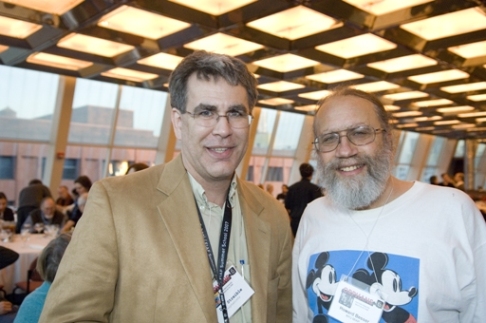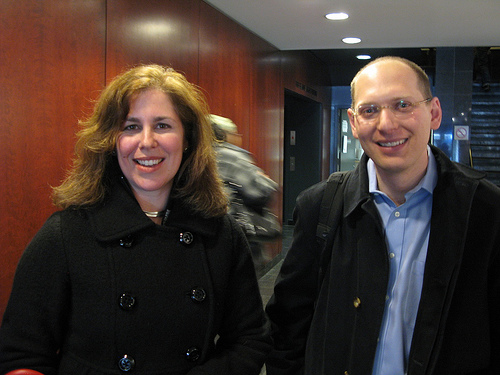After attending Saturday morning’s second panel discussion, I began compiling a list of “You know you’re at Orphans when…” moments. You know you’re at Orphans when Jafar, Ursula, and other Disney villains help explain copyright law. You know you’re at Orphans when you view a re-mix video of re-mix video, sprinkled with a bit of JibJab parody. And you know you’re at Orphans when one presenter encourages archivists, librarians, curators, artists and the like to break the law, which is followed shortly thereafter by a presentation from a lawyer. Fortunately for me, all three of these events took place during “Orphan Works:” Law, Policy, and the Moving Image, which focused on the ramifications of living in a “permissions culture.”
A Fair(y) Use Tale, Professor Eric Faden of Bucknell University
To sum up Howard Besser’s presentation in one sentence: “If we really want to do our jobs responsibly, we are going to have to break the law.” Howard, Director of the MIAP Program at NYU, described the problematic nature of current copyright law and the importance of copyrighted material to the creative process. In terms of the Orphan Film Symposium, Howard explained that it would have taken months and an extensive budget to fully adhere to the copyright law for all our screenings. He used some of this year’s Orphan films, La Venganza de Pancho Villa, Noticiario de Laya #3, and Sunday, to emphasize the complicated underlying rights embedded in each work. As a small silver lining, Howard presented a report released Friday from the Section 108 Study Group of the Copyright Office. The report stated that it “may be possible” to expand copyright exemptions to librarians for audio/visual material. In other words, the flexibility that librarians have in reproducing and distributing textual material may be expanded to include media. (The key words in all this are “may be” as the report stated further evidence was needed to implement the change.)

Howard lectures on copyright. Photo by Rick Prelinger.

Howard sending out Disney love
The following presenter, Peter Decherney, who is currently writing a book on Hollywood and copyright law, explained other exemptions made by the copyright office. More specifically, he outlined his efforts in 2006 to allow professors of Film or Media Studies to present clips of DVDs as part of class instruction, an action otherwise prohibited under copyright law. Facing opposition from Time Warner, Pioneer, and the Motion Picture Association, Peter's exemption was granted provided that the material presented in class is included in the department's libraries. The Copyright Office will make more exemption rulings in 2009, and Peter hopes to expand the exemption to include other professors and students.

Rina Pantalony and Peter Decherney. Photo by Rick Prelinger.
Our enlightening discussion ended with Rina Pantalony, a lawyer with the Canadian Justice Department and Adjunct MIAP professor who explained the role of Fair Use policy. Acknowledging the frustration and lack of dialogue within our "permissions culture,' Rina explained the importance of a detailed internal policy in order to abate risks with copyrighted material. While not encouraging blatant law-breaking, Rina argued that institutions and professionals should implement policy (such as the "Best Practices Protocol" in the documentary film community) and apply it in a consistent way. She also encouraged both sides of the argument to come together and endorse such policy making.
The panel sparked interesting and lively debate that spilled over into our break. Thank you to Orphans for providing the forum to discuss these issues with such an eclectic panel and audience. Luckily, tensions were cooled as we shifted our attention to films focusing on the "real" orphans.